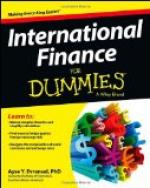For our present purpose it is enough to have shown that the capital, which is the stock-in-trade of finance, is not a fraudulent claim to take toll of the product of industry, but an essential part of the foundation on which industry is built. A man can only become a capitalist by rendering services for which he receives payment, and spending part of his pay not on his immediate enjoyment, but in establishing industry either on his own account or through the agency of someone else to whom be lends the necessary capital. Before any industry can start there must be tools and a fund out of which the workers can be paid until the work that they do begins to bring in its returns. The fund to buy these tools and pay the workers can only be found out of the proceeds of work done or services rendered. Moreover, there is always a risk to be run. As soon as the primitive savage left off making everything for himself and took to doing some special work, such as arrow making, in the hope that his skill, got from concentration on one particular employment, would be rewarded by the rest of the tribe who took his arrows and gave him food and clothes in return, he began to run the risk that his customers might not want his product, if they happened to take to fishing for their food instead of shooting it. This risk is still present with the organizers of industry and it falls first on the capitalist. If an industry fails the workers cease to be employed by it; but as long as they work for it their wages are a first charge which has to be paid before capital gets a penny of interest or profit, and if the failure of the industry is complete the capital sunk in it will be gone.
FOOTNOTES:
[Footnote 1: Pages 24, 25.]
CHAPTER II
BANKING MACHINERY
Capital, then, is wealth invested in industry, finance is the machinery by which this process of investment is carried out, and international finance is the machinery by which the wealth of one country is invested in another.
Let us consider the case of a doctor in a provincial town who is making an annual income of about L800 a year, living on L600 of it and saving L200. Instead of spending this quarter of his income on immediate enjoyments, such as wine and cigars, and journeys to London, he invests it in different parts of the world through the mechanism of international finance, because he has been attracted by the advantages of a system of investment which was fashionable some years ago, which worked by what was called Geographical Distribution.[2] This meant to say that the investors who practised it put their money into as many different countries as possible, so that the risk of loss owing to climatic or other disturbances might be spread as widely as possible. So here we have this quiet country doctor spreading all over the world the money that




